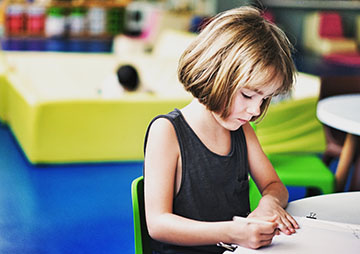by Catherine Fischer
Oh, boy, it’s that time of year again. Many of us parents and guardians have been working through our checklists, buying new shoes for our kids (who’ve been barefoot or in sandals all summer), and picking out fall clothes for kids who’ve sprouted since June. We’re smoothing the path as much as we’re able, sometimes stopping by the school beforehand for trial runs, figuring out the bus schedule and aftercare, or maybe counting down the days until school starts again.
No matter what the lead-up to school looks like for us, we’re all hoping for things to go well for our kids. But by now, some of us can already see that it’s not going how we had hoped. Perhaps getting out the door in the morning is a struggle, or maybe our kids are coming home unhappy, angry, or withdrawn. Whatever is causing discord, when our children are struggling and things are out of balance, everyone in the family is affected.
If you’re looking for ways to restore the harmony and happiness that seem to evaporate with the start of the school year, here are a few tips that can make a big difference for the whole family.
Focus on Connection
Children need a lot of connection. Human brains are wired to grow and learn in connection with other minds, and a sense of safety is necessary for learning to take place. However, even the most loving teachers cannot offer constant connection to the room full of children they are responsible for, and the expectations of school are more demanding on children now than ever before.
Keep in mind that children who have been in daycare for years will also have to adjust to the increased expectations for sitting in one place and listening quietly. There are also numerous academic expectations that have slowly crept into the earlier years of school, taking away much of the time children used to have for play. Even if a child likes school, he may come home with a bunch of feelings that have been stored up during the day.
Children often can’t relax and enjoy their time with you and their siblings until they get some help reconnecting. So how do we address this basic, human need when we see our children are struggling?
Below are some ways you can help your child to reconnect with you.
Before school: Sometimes our hectic mornings can cause children to feel disconnected before they’ve even left the house. Try finding a way to slow things down for a few minutes and spend some one-to-one time with a child before leaving the house; this seemingly small action can make a world of difference to the child, and may set the tone for his entire day.
At drop off: If your child’s struggles begin when it’s time to say goodbye, arriving a few minutes early to help them to settle into their classroom, and asking a teacher or caregiver to connect with your child before you leave, can help with the transition. Please don’t leave without saying goodbye to your child! (More on this below.)
After school: Develop a connection ritual such as a high five, a warm hug, or a joke that gets everyone laughing. Try to hold off on your questions until after your child has had a chance to bask in your attention for a little while.
Expect Feelings
This is the piece of advice that might sound the most foreign. Rather than trying to set up a routine that always keeps the lid on our children’s feelings, consider that the outpouring of emotion is part of what is needed to smooth the bumpy back-to-school feelings. Fears about separation, hurts from interactions with kids or teachers at school — even stored up feelings of boredom — will drive our children’s behaviors off-track until they are released.
Once we’ve been able to successfully reconnect with our children — by sitting down to play Legos for five minutes before putting on shoes and leaving the house; by lovingly promising that we will be there at the end of day instead of leaving without saying goodbye; or by happily making eye contact and hugging them when they finish their school day before we start asking them questions such as, “What did you learn today?” — we are letting them know that we’re here for them in language that their worried minds can understand.
When this happens, some of the feelings they’ve been trying to hold at bay might come pouring out. And when they do, we can offer them the following gift.
Make Time to Listen
Offering children our warm attention when they begin to cry or tantrum, rather than trying to get them to stop, offers them the opportunity to offload the upset that has stored up and regain their cooperative, confident nature. Time pressures can often make listening a challenge. If your child is having difficulty with getting out the door, or with drop off, try to leave some extra time for this part of the routine; it makes stopping to listen to feelings easier.
Sometimes there’s nothing to be fixed. Our children just need us to listen while they show us how hard something feels. It’s not always easy to stay calm and relaxed when our children are offloading big feelings, but when we can, we are offering them a safe port in their emotional storm.
Listening doesn’t always have to be for tears. Laughter is another wonderful way to release a bit of fear. If you notice that something you say or do makes your child laugh, do it again! (With the exception of tickling, because this can easily result in children feeling overpowered.) Playing with our children to help them laugh is a great way to build connection and release tensions at the same time.
One Final Pro Tip
You may also need to use these three steps for yourself and your own feelings! Many of us have feelings around school and separation that can surface when we send our children off to school.
If you find yourself feeling out of sorts, grab a friend who’s a good listener and ask them to listen to you for five minutes without interrupting or giving you advice. Tell them everything you are feeling about back-to-school, what you remember about your own experiences, and what it’s like to see your child heading off to school. Sometimes just getting all of that off our chests helps us to be more playful, warm, and caring toward our children when they are struggling.
Good luck, dear parents! I hope you will find something here that is helpful to you. Thank you for the hard work you do every day to love your children well.
Catherine Fischer is a certified Hand-in-Hand Parenting instructor, a mom, and a birth and postpartum doula. She’ll be speaking more in-depth about how to handle a bumpy back-to-school experience at the Mallet’s Creek branch of the Ann Arbor District Library on September 18th. You can find out more about her services at SupportForGrowingFamilies.com.




























































































































































































Awareness helps us understand and neutralize situations, allowing them to feel less personal. Unconscious patterns like bullying, judgment, and anger become conscious as our awareness grows. As the saying goes, “hurt people hurt people.” When awareness grows, and we become conscious of our emotions, we are more able to transcend behaviors that cause us (or others) to be hurt